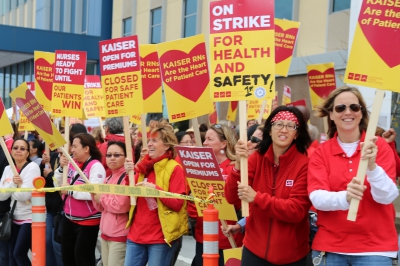The Logic of Short Hospital Strikes
http://www.labornotes.org/2014/12/logic-short-hospital-strikes

Kaiser Permanente nurses in California walked out November 11 on a two-day strike. Despite challenges unique to the sector, health care strikes can be powerful. Photo: California Nurses Association.
December 08, 2014 / Alexandra Bradbury
Picture a strong strike. Production is halted, right? The factory floor is empty, machines stand silent, robust pickets keep scabs out. The boss, caught off guard and losing money by the day—or the hour—relents and agrees to the workers’ demands.
But when you’re striking at a hospital, most of that goes out the window. Leaving patients with no one to care for them is the last thing your union’s caregiver members would do. Besides, the law says you have to give the employer 10 days’ warning so they can arrange for scabs to replace you.
And most often health care strikes aren’t open-ended: the union announces in advance the strike will last one day, or two.
So, how do you make a health care strike strong? What’s the point in striking at all when the boss has substitutes lined up, and knows the crisis will end by Thursday? I talked with longtime strategists from several unions.
A COSTLY DAY
- See more at:
http://www.labornotes.org/2014/12/logic-short-hospital-strikes#sthash.fPNfnFuW.dpuf
FULL story at link.
